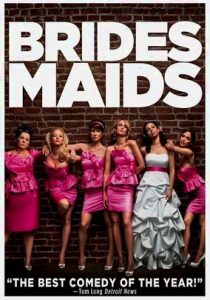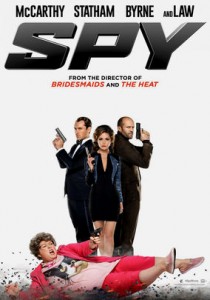Bridesmaids-2011
Director Paul Feig
Starring Kristen Wiig, Maya Rudolph
Top 250 Films #216
Scott’s Review #784
Reviewed July 6, 2018
Grade: A
Despite the raunchy romantic comedy genre not being my favorite, and despite not being such a fan of Judd Apatow (famed producer of several of these types of films), Bridesmaids (2011) is easily the best of its kind.
Influential in a multitude of female empowerment-themed comedies that followed, this one is witty, genuine, and funny because of its star, Kristen Wiig, who also co-wrote the film.
It is one of the best comedies (if not the best) of the decade.
Apatow is known mainly for producing comedy films that mix in the standard potty humor for cheap laughs. He is responsible for This Is 40 (2012) and Trainwreck (2015), both of which I found moderately funny, but they are also needlessly gross-out and tired.
My point is that minus the talents of Wiig (both in front of and behind the camera), Bridesmaids would likely have been mediocre like these films. Instead, Bridesmaids is a wonderful, uproarious experience with a star who captures a moment.
My one gnawing gripe is that a woman shouldn’t direct a film about women.
Annie (Wiig) has been asked to serve as the maid of honor at her best friend, Lillian’s (Maya Rudolph), upcoming wedding. Rather than being thrilled, Annie is depressed due to an ongoing string of bad luck.
Her bakery business fails, she loses her unfulfilling job at a jewelry store, she is dating a jerk (Jon Hamm), and her car is about to die. She has difficult roommates and is on the verge of having to move back in with her mother at age thirty-five.
The story hilariously follows Annie’s rivalry with Helen (Rose Byrne), Lillian’s soon-to-be husband’s boss’s controlling wife. Helen is intent on taking over the handling of the wedding events, much to Annie’s chagrin.
The ladies compete to one-up each other throughout the film- Rose is the perfect princess for Annie’s grit and cynicism.
Annie struggles through her issues, unhappy with the state of her love life, when she meets police officer, Rhodes (Chris O’Dowd), and they begin a tender friendship. However, their attraction is put to the test because of Annie’s shenanigans.
Annie must then fly to Las Vegas with the other bridesmaids despite being terrified of flying.
Despite the story being nothing not seen dozens of times before in romantic comedy history (the setups), the film is a laugh-out-loud riot. In addition to Wiig, Rudolph, and Byrne, the remaining cast of ladies all have tremendous chemistry with each other.
Special kudos go to Melissa McCarthy in her fearless role of Megan, a tomboy misfit who somehow is part of the wedding party. With her “tell it like it is” attitude, the actress sinks her teeth into this fabulous role without taking it too far across the line into ridiculousness.
In rip-roaring fashion, multiple scenes are permanently etched in my mind.
After Annie suggests a Brazilian steak restaurant for lunch, followed by a fitting at a chic dress shop, the girls suffer from food poisoning. This results in torrents of diarrhea scenes and one unlucky character being reduced to going to the bathroom in the middle of the street.
The scene, while super raunchy, is hilarious and fraught with perfect comic timing.
Not to be outdone, the airplane scene is equally tremendous; however, the scene belongs to Wiig rather than the entire ensemble. Being forced to fly coach while everyone else is treated to first-class, Annie unwisely accepts a pill from Helen to calm her during the flight.
Instead, Annie becomes belligerent and wild when she mixes the sedative with alcohol.
As good as the supporting cast is, Wiig owns the film through and through. Every scene she is in and each line she utters is perfectly timed. The fact that Wiig did some improvisation (the scene in the jewelry store) is evident and only adds to the genuine feel of the film.
Subsequently, to Wiig’s credit, she has been careful to choose more complicated roles to avoid the risk of being typecast. And a sequel was wisely never made- this would have ruined the appeal.
Bridesmaids (2011) is an authentic story rich with hilarity and crisp dialogue. The film is enhanced in that it’s a female-centered film written by women (though the direction and producers, too, would have been better).
Because of the tremendous cast led by Wiig, the film is blazing with humor and led a firestorm of similar “girl power” films (mostly bad) well into the decade.
Oscar Nominations: Best Supporting Actress-Melissa McCarthy, Best Original Screenplay

